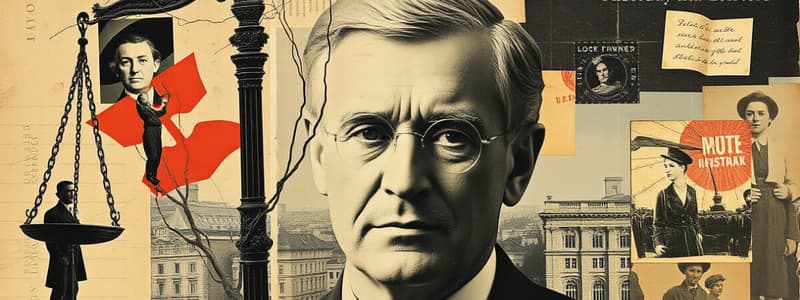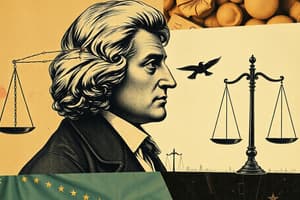Podcast
Questions and Answers
What are natural laws?
What are natural laws?
Rules discovered by use of reason such as gravity and magnetism.
What is the Social Contract according to Hobbes?
What is the Social Contract according to Hobbes?
An agreement that gave up people's freedom for an organized society.
What are natural rights?
What are natural rights?
Rights which belong to all humans from birth.
What is rationalism?
What is rationalism?
What is The Encyclopedia?
What is The Encyclopedia?
Who are Physiocrats?
Who are Physiocrats?
What is mercantilism?
What is mercantilism?
What is capitalism?
What is capitalism?
What is a salon?
What is a salon?
Who are enlightened despots?
Who are enlightened despots?
What was Thomas Hobbes' view of human nature?
What was Thomas Hobbes' view of human nature?
What did Montesquieu advocate for in government?
What did Montesquieu advocate for in government?
What was Rousseau's main belief about society?
What was Rousseau's main belief about society?
What did John Locke believe about government?
What did John Locke believe about government?
What did Voltaire critique?
What did Voltaire critique?
Who is Adam Smith?
Who is Adam Smith?
What is deficit spending?
What is deficit spending?
What was the Estates General?
What was the Estates General?
What is the National Assembly?
What is the National Assembly?
What was the National Convention?
What was the National Convention?
What was the Tennis Court Oath?
What was the Tennis Court Oath?
What comprised the First Estate?
What comprised the First Estate?
What comprised the Second Estate?
What comprised the Second Estate?
Study Notes
Key Concepts of the Enlightenment
- Natural laws: Rules identified through reason, such as gravity and magnetism, influencing beliefs about governance and society.
- Social Contract: A concept developed by Hobbes where individuals consent to surrender freedom for societal order.
- Natural rights: Fundamental rights inherent to all humans from birth, foundational to modern democratic thought.
- Rationalism: The philosophy prioritizing logic and reason as the basis for actions and beliefs.
Influential Works and Ideas
- The Encyclopedia: A collection of 28 volumes edited by Diderot, covering diverse topics like government and philosophy, advocating for freedom of expression and denouncing slavery.
- Physiocrats: French economists emphasizing reforms grounded in natural laws, particularly in economic matters.
- Mercantilism: Economic doctrine advocating self-sufficiency based on gold and silver reserves.
- Capitalism: An economic system where goods are produced and traded by private businesses rather than government control.
Cultural Movements
- Salon: Informal gatherings for intellectual exchange among writers, artists, and philosophers, facilitating the spread of Enlightenment ideas.
Political Theories and Philosophers
- Enlightened despots: Absolute rulers who implemented reforms inspired by Enlightenment principles for social and political improvement.
- Thomas Hobbes: Advocated for monarchy, viewing humans as inherently selfish; believed in strong government to curb natural tendencies toward competition and violence.
- Montesquieu: Proposed the separation of government into three branches and held controversial views on gender roles and religion.
- Rousseau: Criticized societal institutions for corrupting human goodness and advocated for direct democracy as the ideal form of governance.
- John Locke: Emphasized self-governance and rights protection; opposed slavery and advocated for a governmental structure with separated powers.
- Voltaire: Focused on combating inequality, injustice, and the slave trade through sharp critique and advocacy for free speech and tolerance.
- Adam Smith: Recognized as the father of capitalism, promoting economic theories aligned with physiocratic principles.
Notable Historical Events
- Deficit spending: A fiscal policy where the government expends more than its revenue, contributing to financial instability.
- Estates General: An assembly of the three social classes whose voting system evolved due to Third Estate pressures; significant in the lead-up to revolutionary changes.
- National Assembly: Formed by the Third Estate seeking legislative power; its declaration followed the Tennis Court Oath, vowing to create a new constitution.
- National Convention: The renamed assembly aimed for a republic, aiming to dismantle monarchy during the Radical Phase of the revolution.
- The Tennis Court Oath: A commitment made by the National Assembly to not disband until a viable constitution was established.
Social Classes in France
- First Estate: Comprised of clergy, representing 1-2% of the population, and typically opposed Enlightenment ideas.
- Second Estate: Made up of the nobility, holding significant social and political privileges, further complicating France's class dynamics.
Studying That Suits You
Use AI to generate personalized quizzes and flashcards to suit your learning preferences.
Description
Test your knowledge on key concepts from the Enlightenment and the French Revolution with these flashcards. Each card presents essential terms and definitions that shaped modern political thought. Perfect for students preparing for exams or anyone interested in history.




